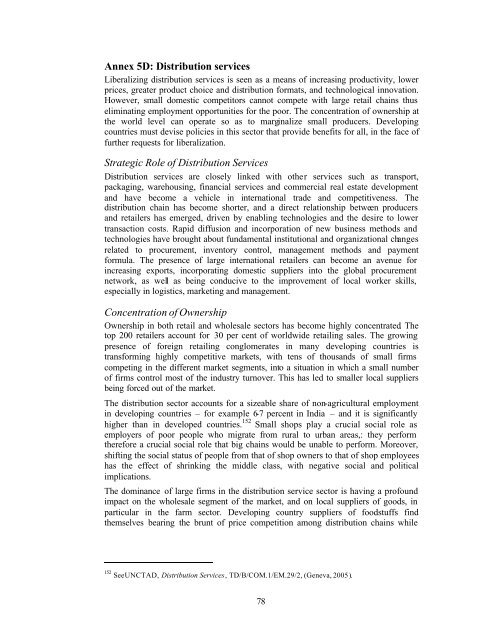Trade Policy Note Final-rev08 - Development
Trade Policy Note Final-rev08 - Development
Trade Policy Note Final-rev08 - Development
Create successful ePaper yourself
Turn your PDF publications into a flip-book with our unique Google optimized e-Paper software.
Annex 5D: Distribution services<br />
Liberalizing distribution services is seen as a means of increasing productivity, lower<br />
prices, greater product choice and distribution formats, and technological innovation.<br />
However, small domestic competitors cannot compete with large retail chains thus<br />
eliminating employment opportunities for the poor. The concentration of ownership at<br />
the world level can operate so as to marginalize small producers. Developing<br />
countries must devise policies in this sector that provide benefits for all, in the face of<br />
further requests for liberalization.<br />
Strategic Role of Distribution Services<br />
Distribution services are closely linked with other services such as transport,<br />
packaging, warehousing, financial services and commercial real estate development<br />
and have become a vehicle in international trade and competitiveness. The<br />
distribution chain has become shorter, and a direct relationship between producers<br />
and retailers has emerged, driven by enabling technologies and the desire to lower<br />
transaction costs. Rapid diffusion and incorporation of new business methods and<br />
technologies have brought about fundamental institutional and organizational changes<br />
related to procurement, inventory control, management methods and payment<br />
formula. The presence of large international retailers can become an avenue for<br />
increasing exports, incorporating domestic suppliers into the global procurement<br />
network, as well as being conducive to the improvement of local worker skills,<br />
especially in logistics, marketing and management.<br />
Concentration of Ownership<br />
Ownership in both retail and wholesale sectors has become highly concentrated. The<br />
top 200 retailers account for 30 per cent of worldwide retailing sales. The growing<br />
presence of foreign retailing conglomerates in many developing countries is<br />
transforming highly competitive markets, with tens of thousands of small firms<br />
competing in the different market segments, into a situation in which a small number<br />
of firms control most of the industry turnover. This has led to smaller local suppliers<br />
being forced out of the market.<br />
The distribution sector accounts for a sizeable share of non-agricultural employment<br />
in developing countries – for example 6-7 percent in India – and it is significantly<br />
higher than in developed countries. 152 Small shops play a crucial social role as<br />
employers of poor people who migrate from rural to urban areas,: they perform<br />
therefore a crucial social role that big chains would be unable to perform. Moreover,<br />
shifting the social status of people from that of shop owners to that of shop employees<br />
has the effect of shrinking the middle class, with negative social and political<br />
implications.<br />
The dominance of large firms in the distribution service sector is having a profound<br />
impact on the wholesale segment of the market, and on local suppliers of goods, in<br />
particular in the farm sector. Developing country suppliers of foodstuffs find<br />
themselves bearing the brunt of price competition among distribution chains while<br />
152 See UNCTAD, Distribution Services, TD/B/COM.1/EM.29/2, (Geneva, 2005).<br />
78
















